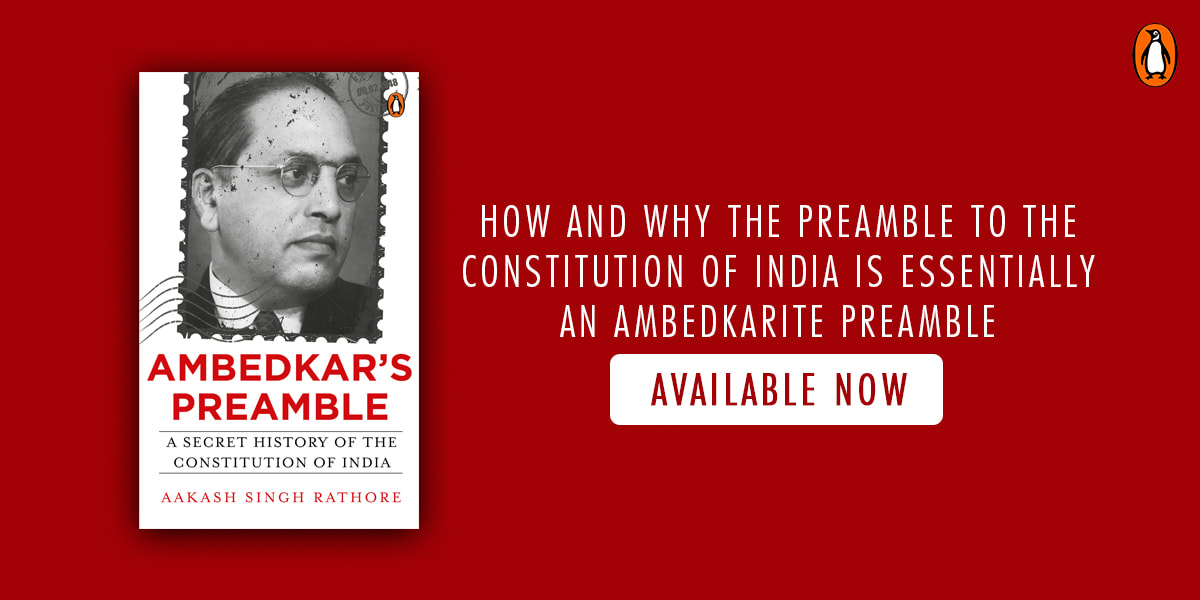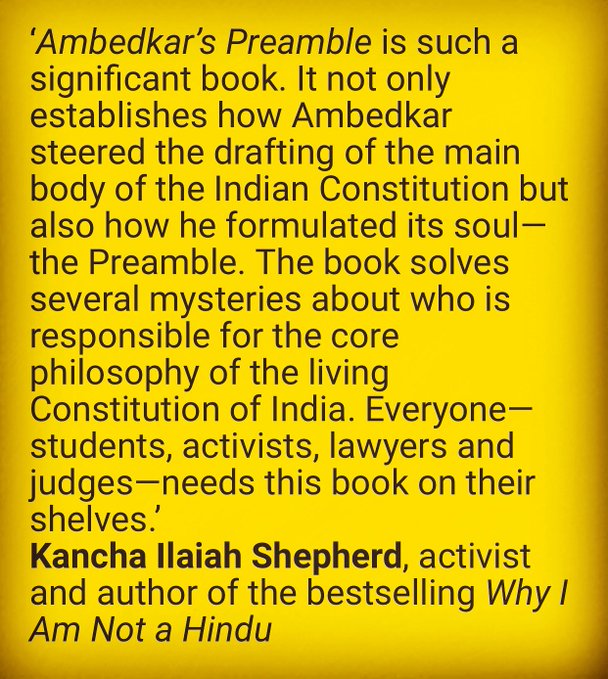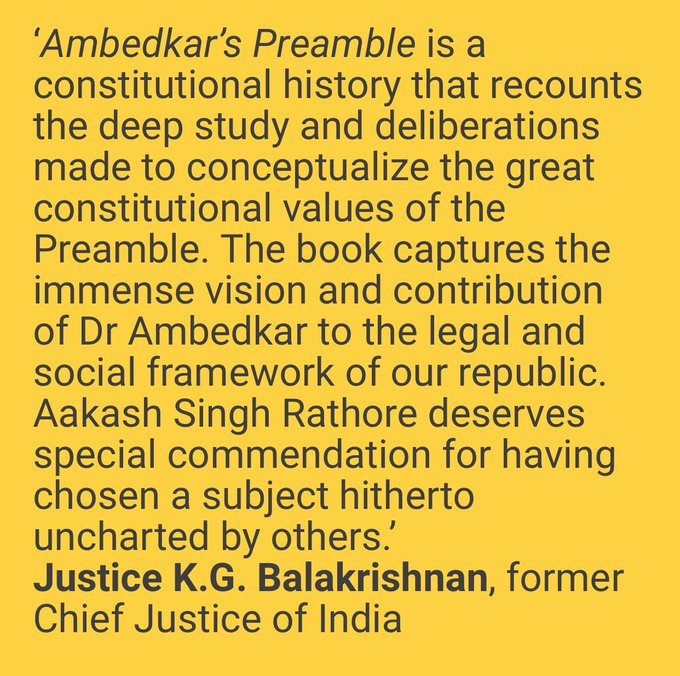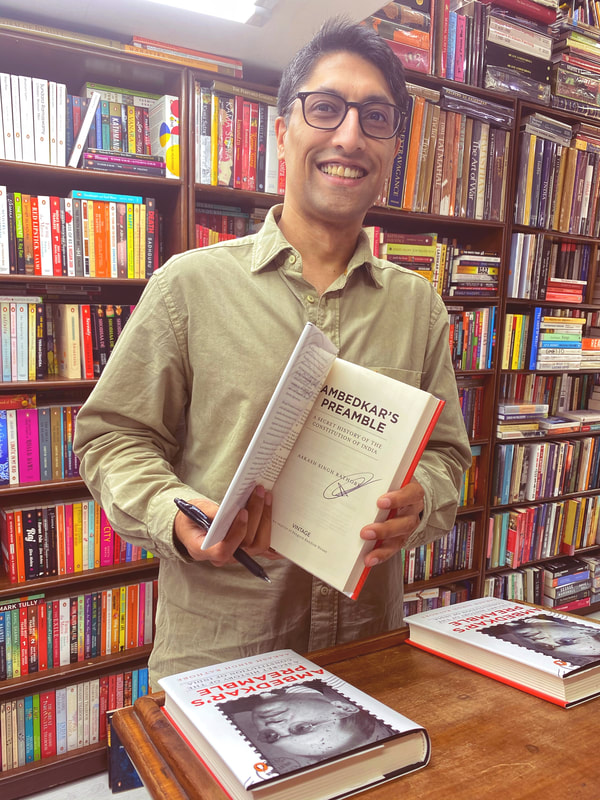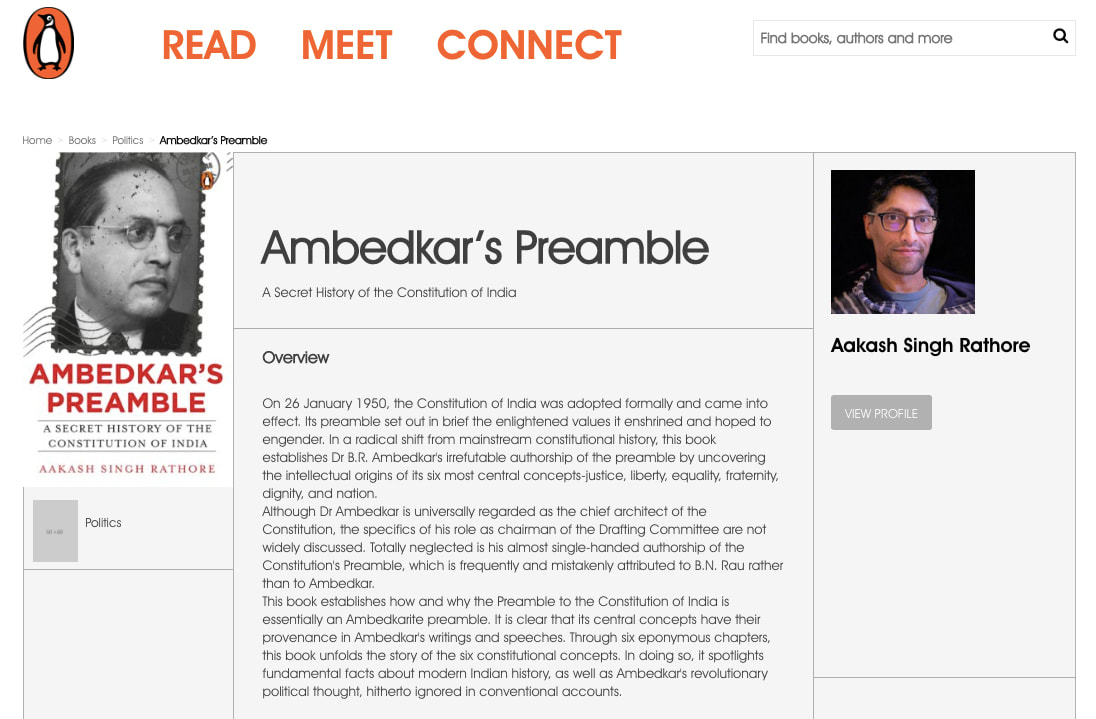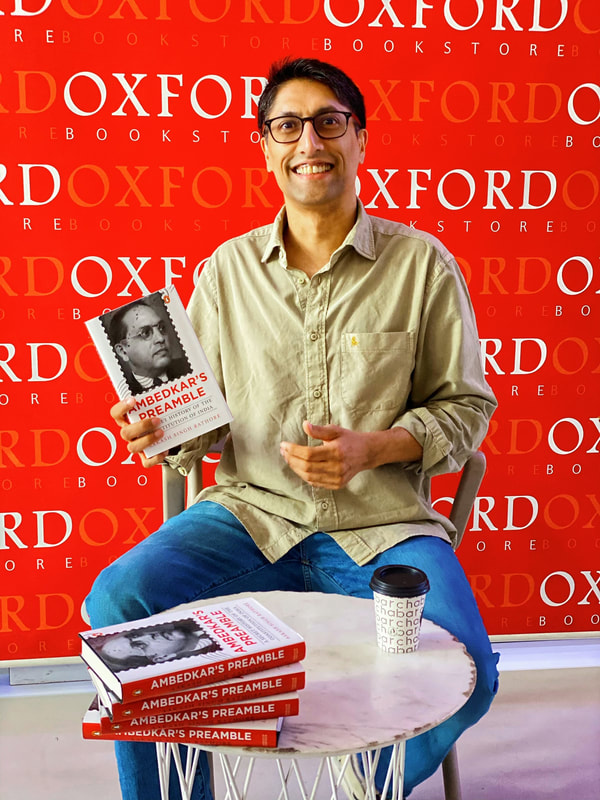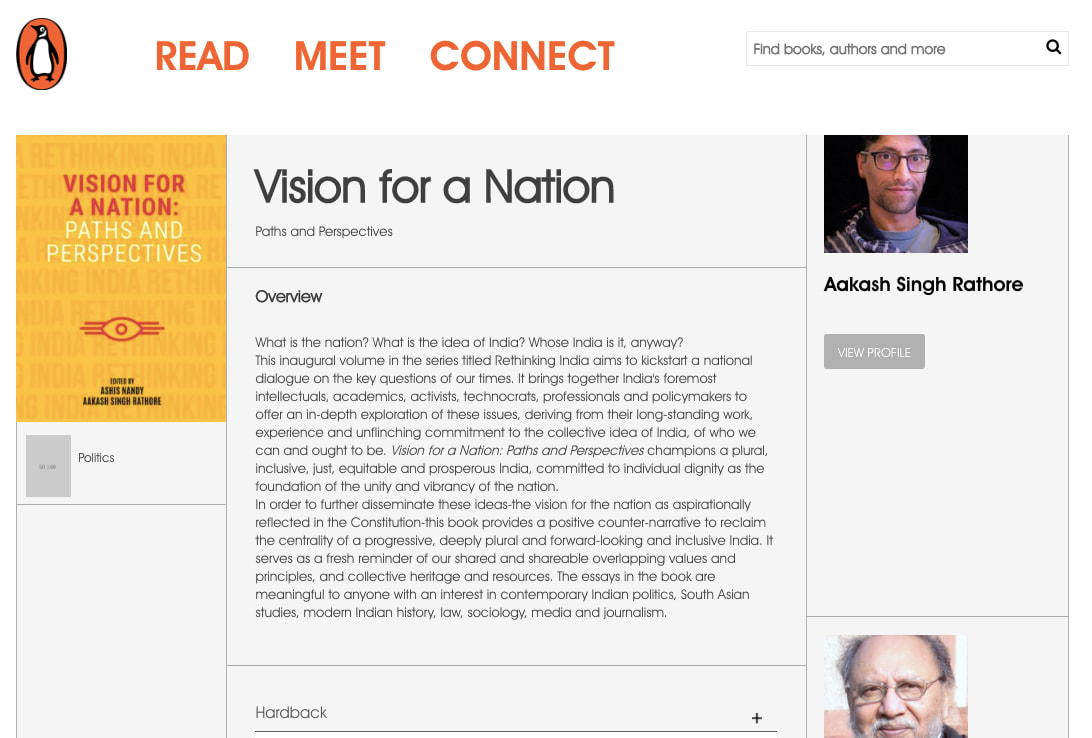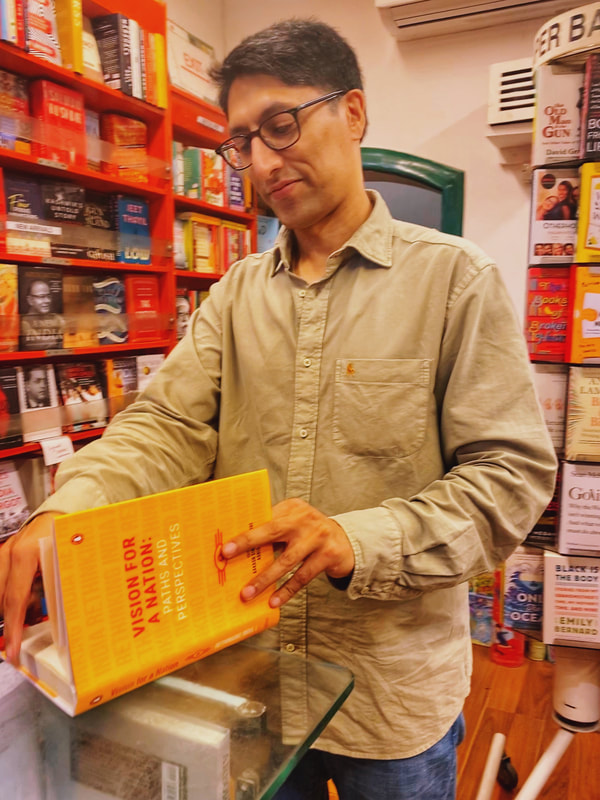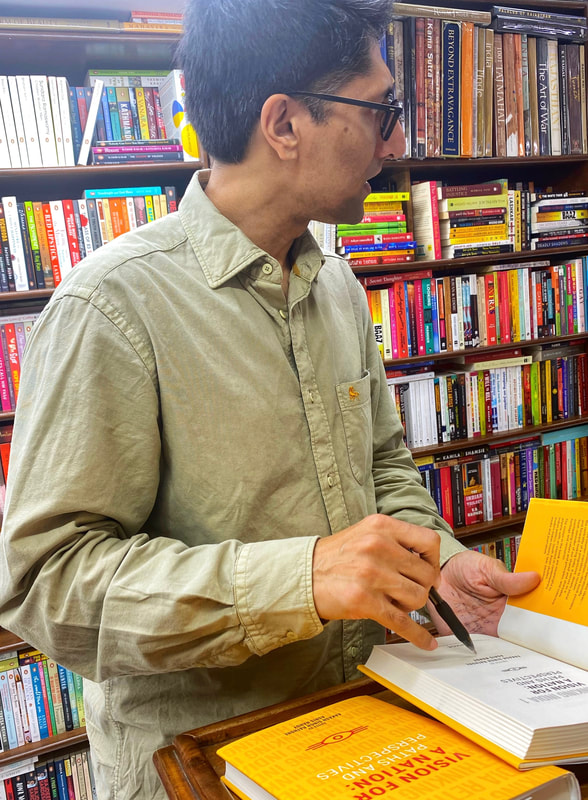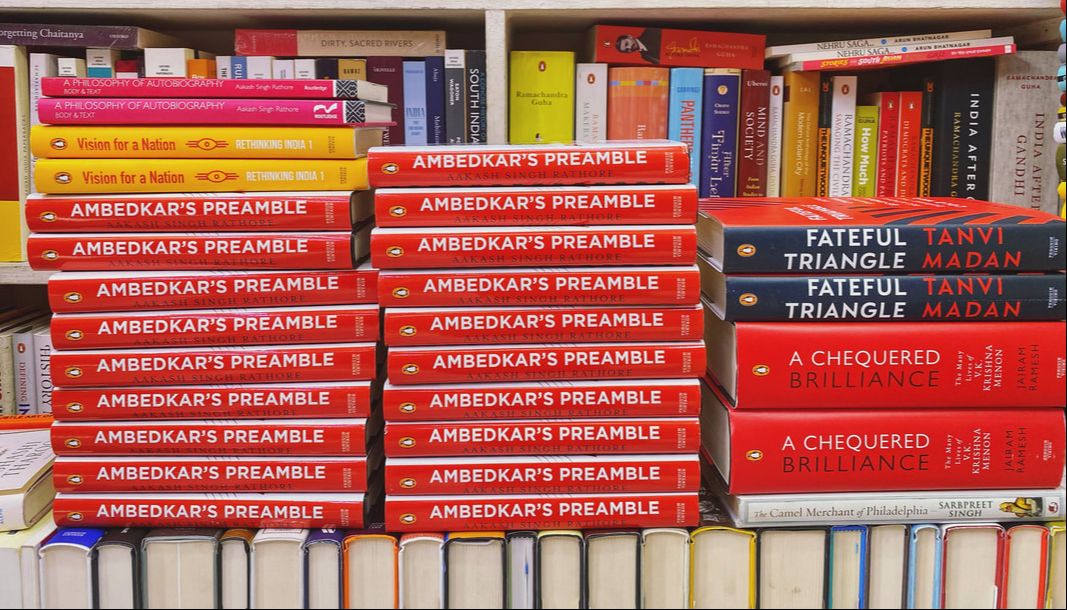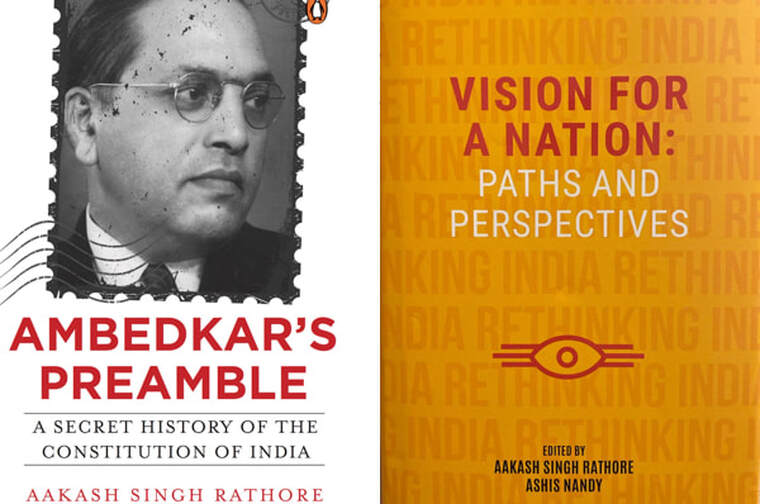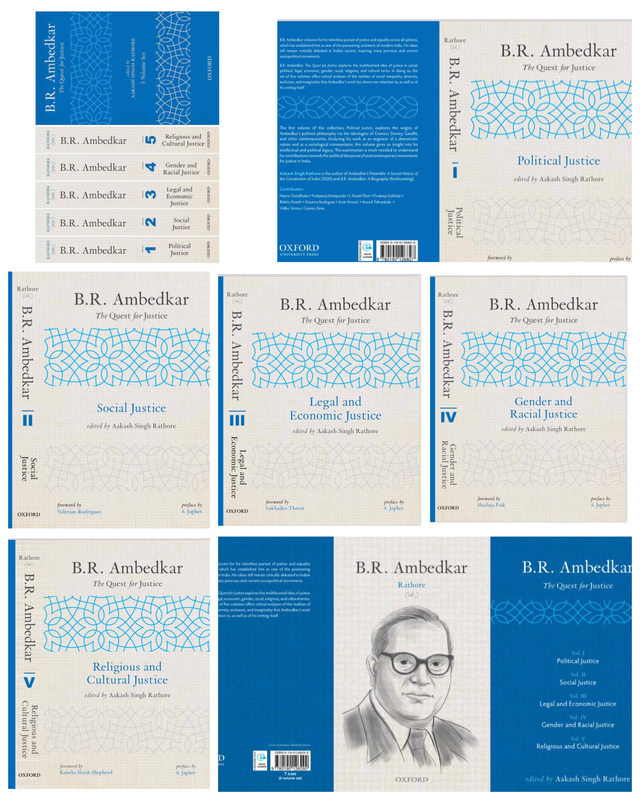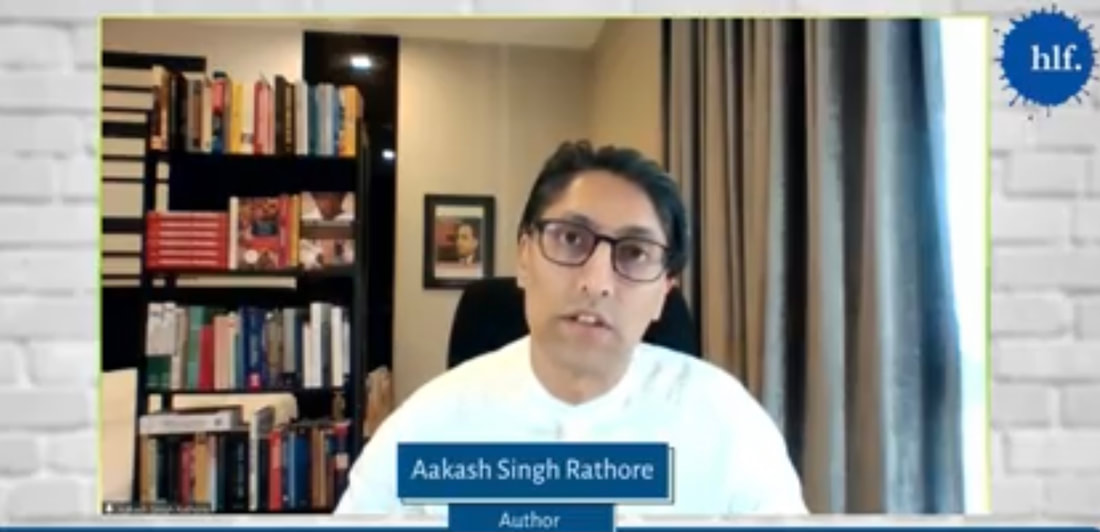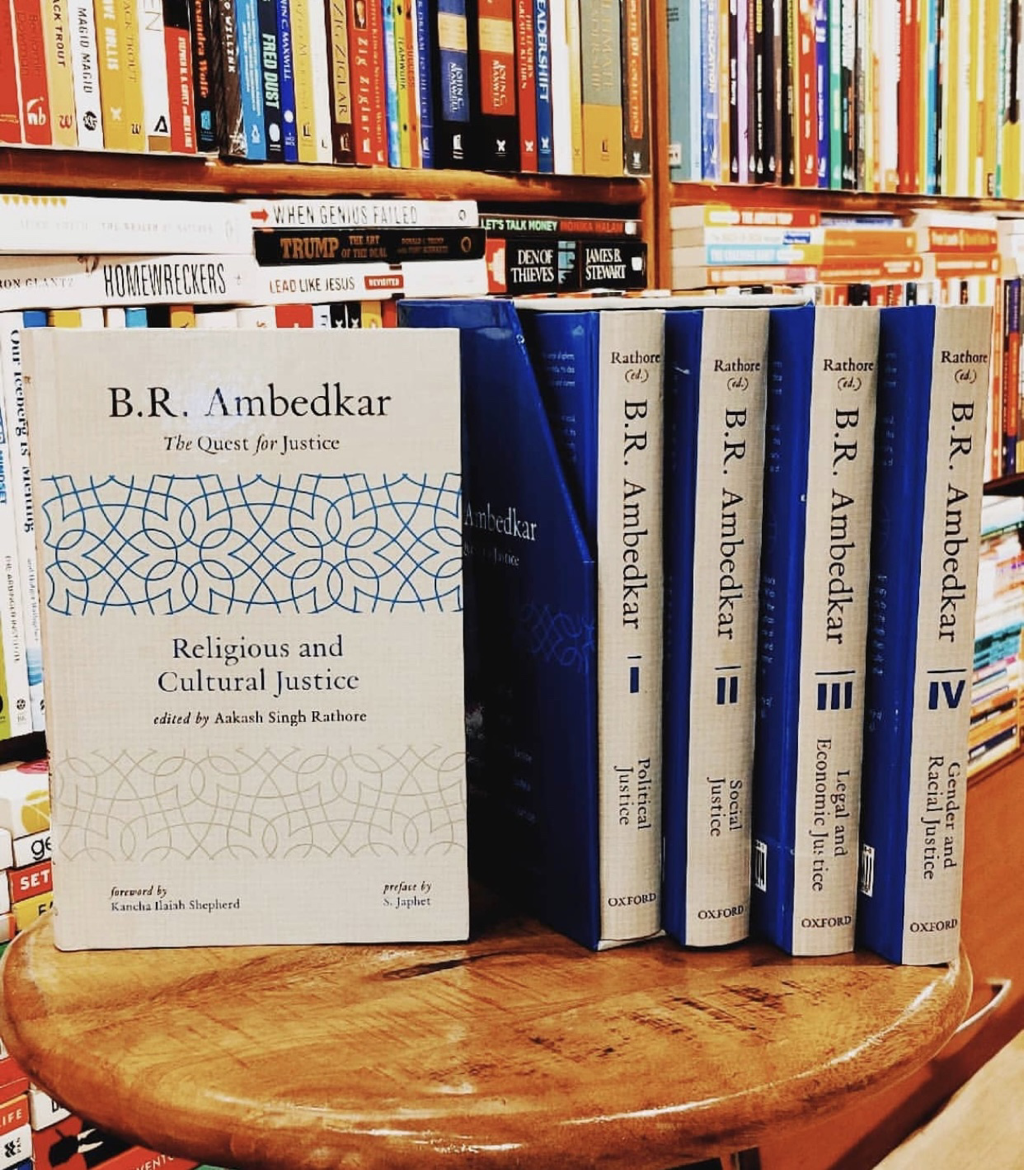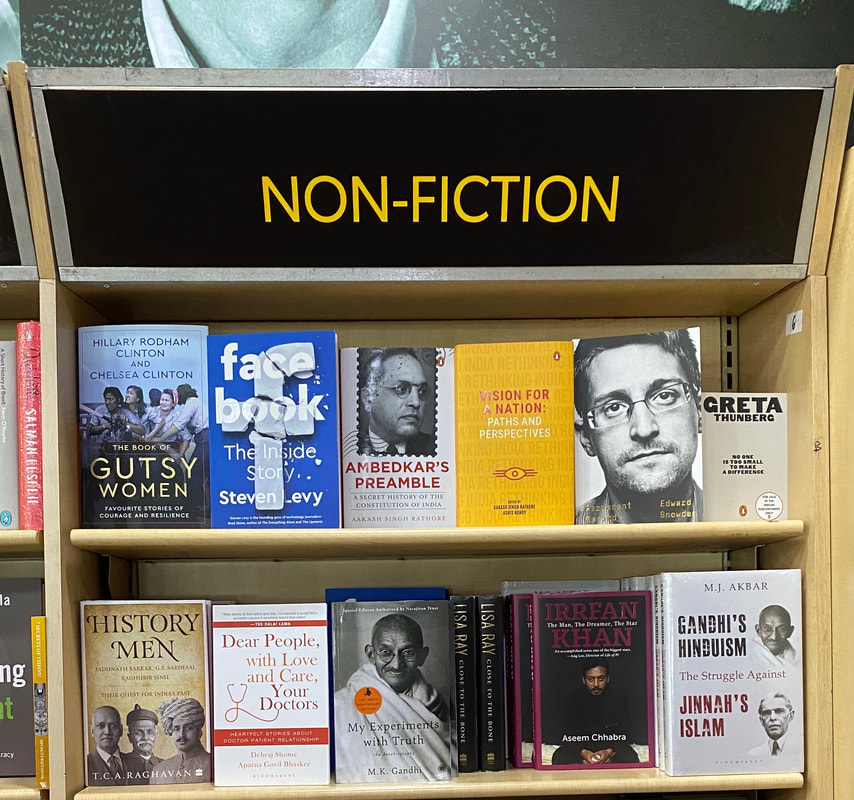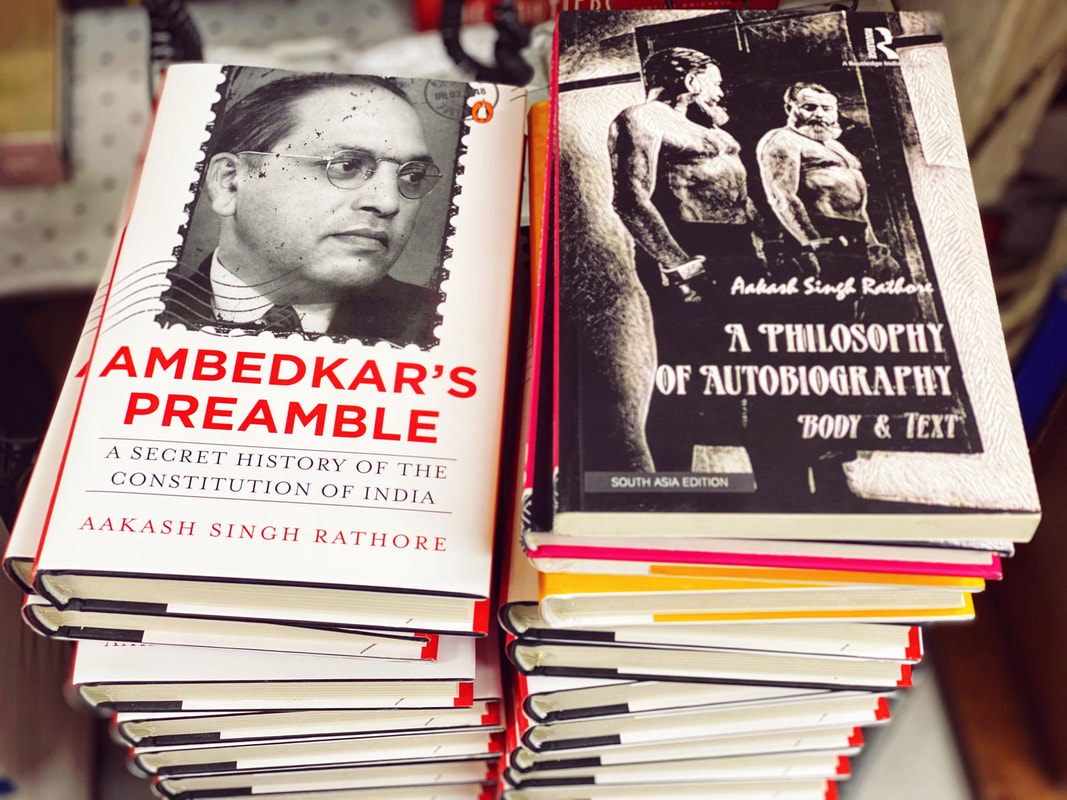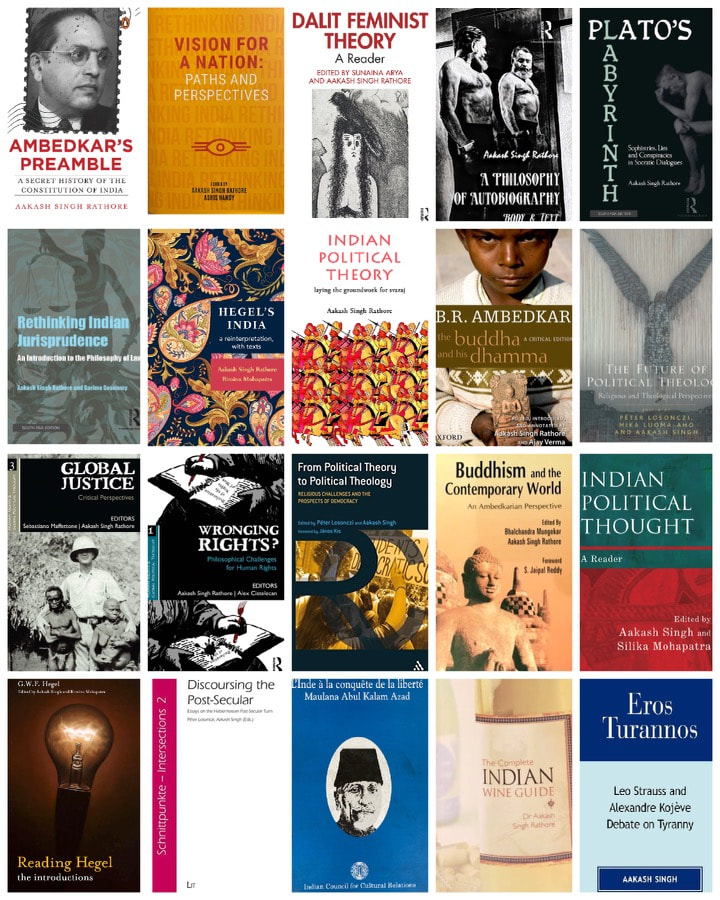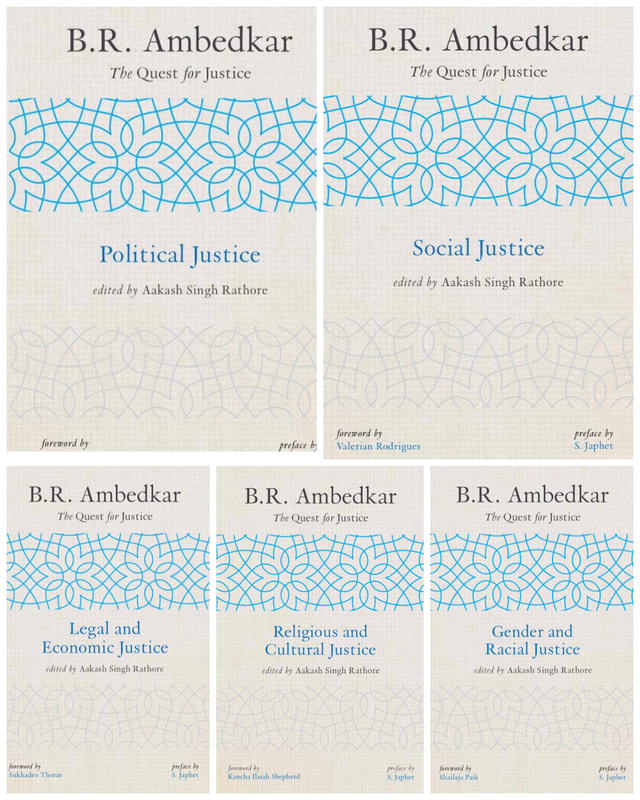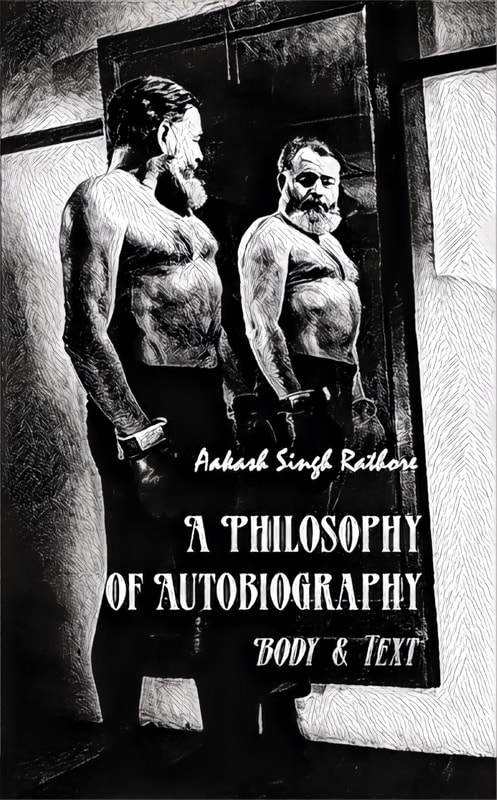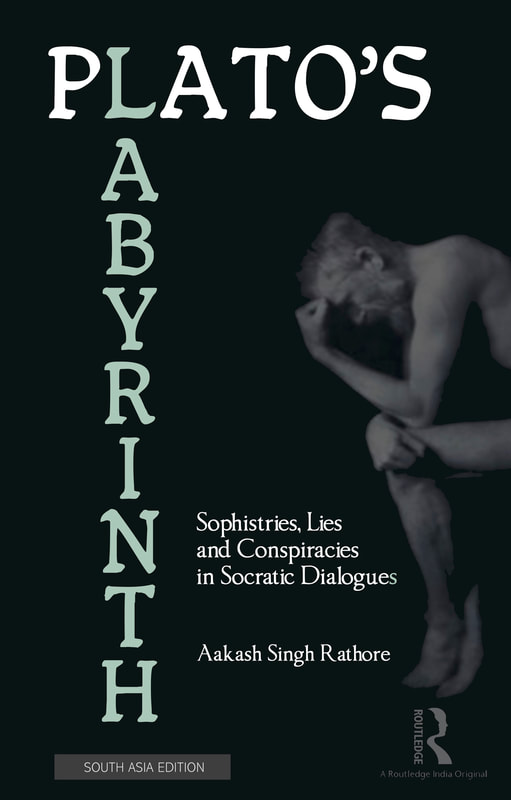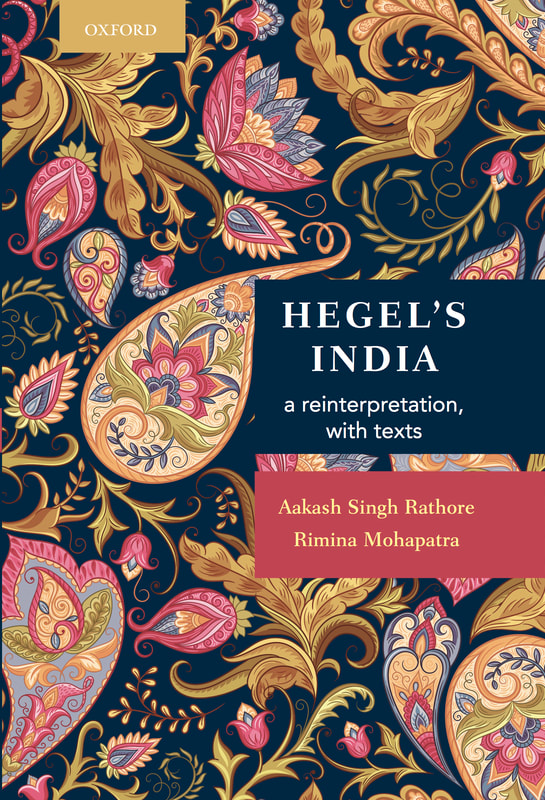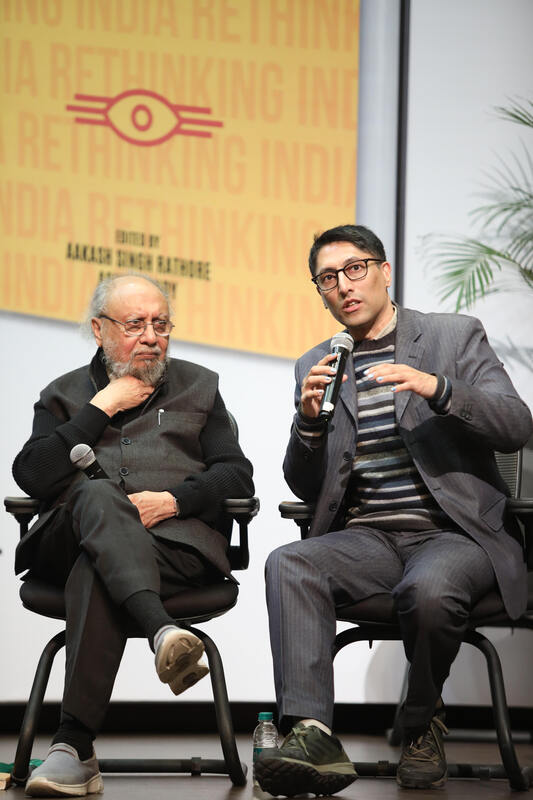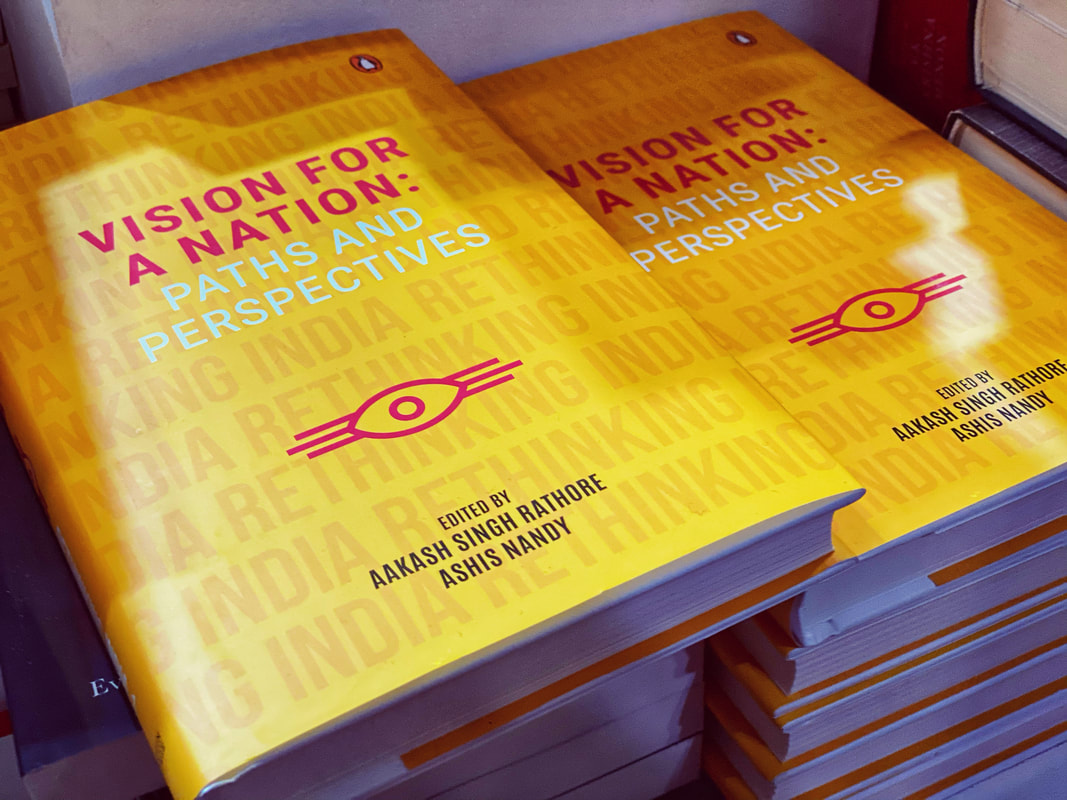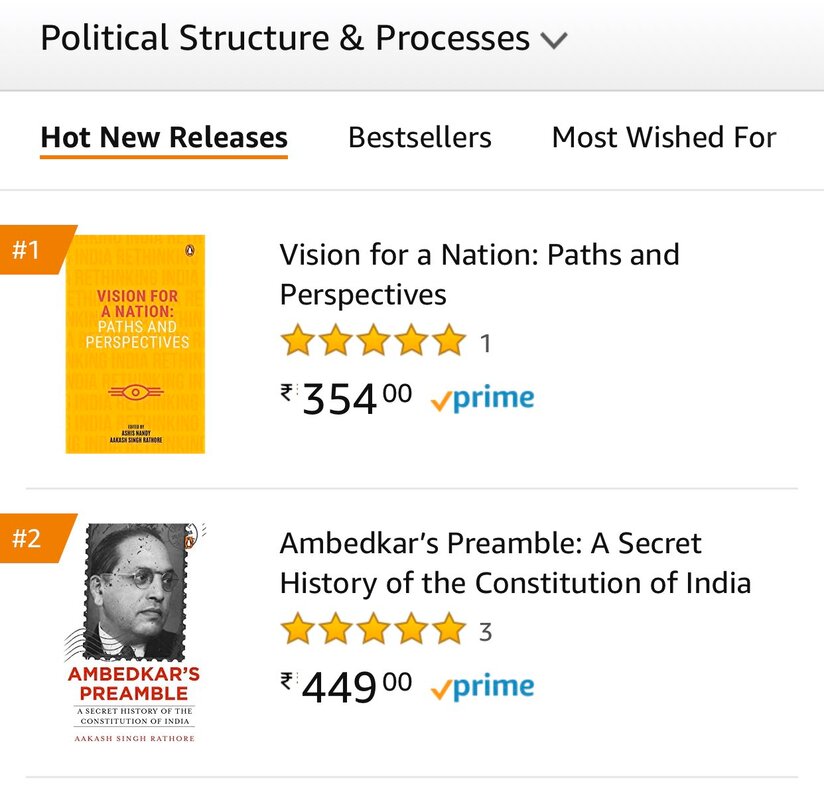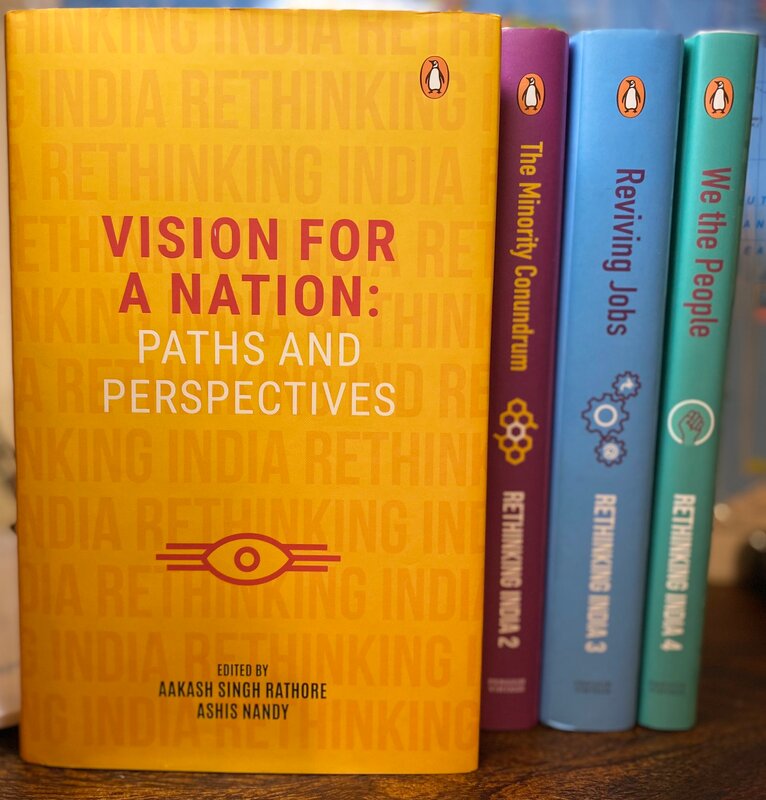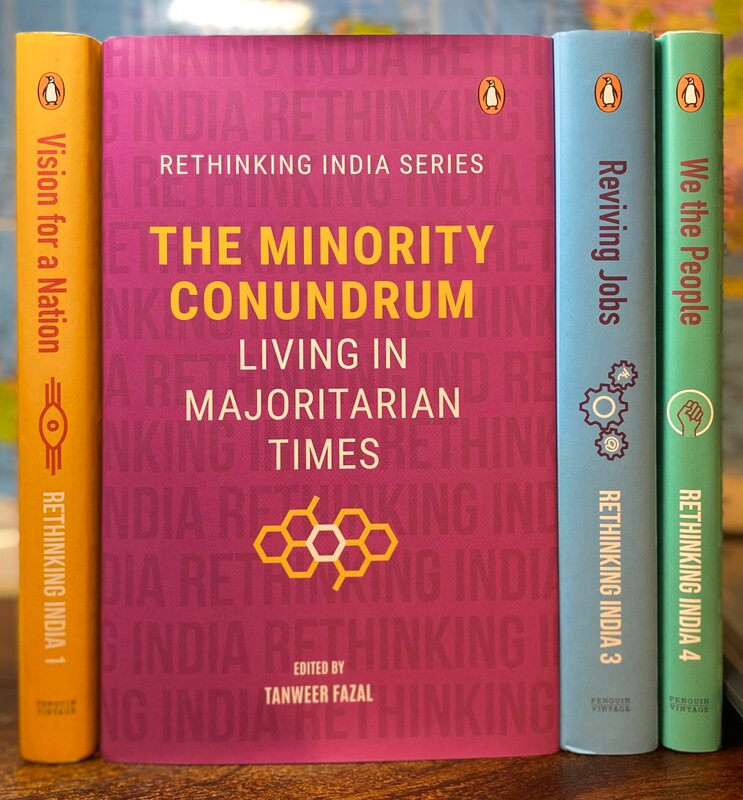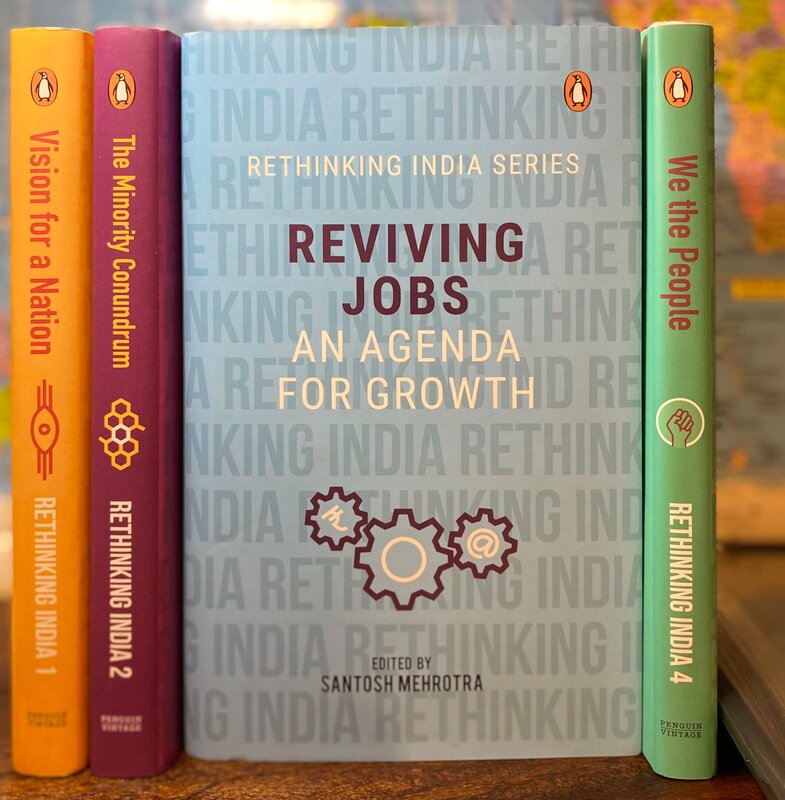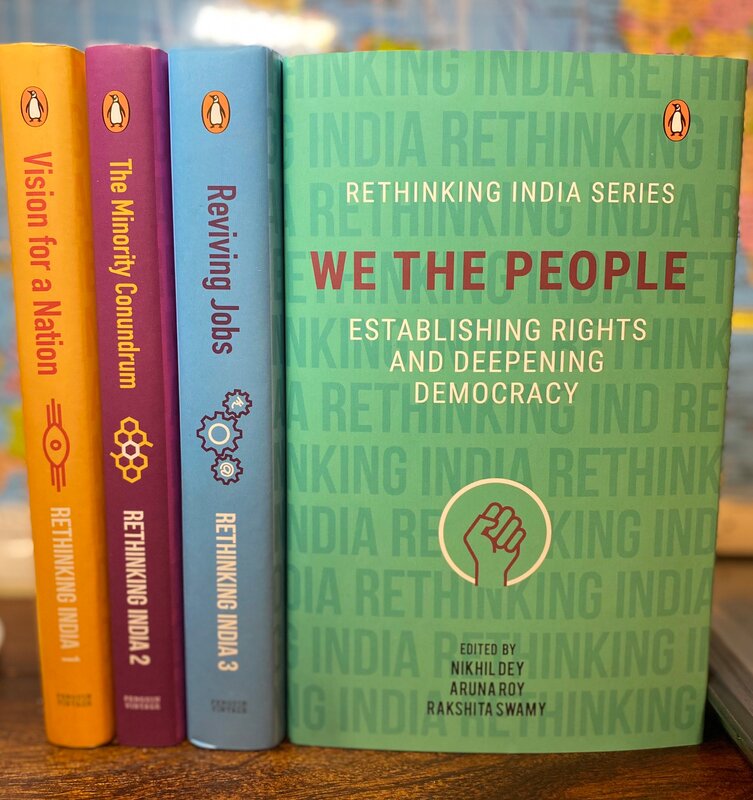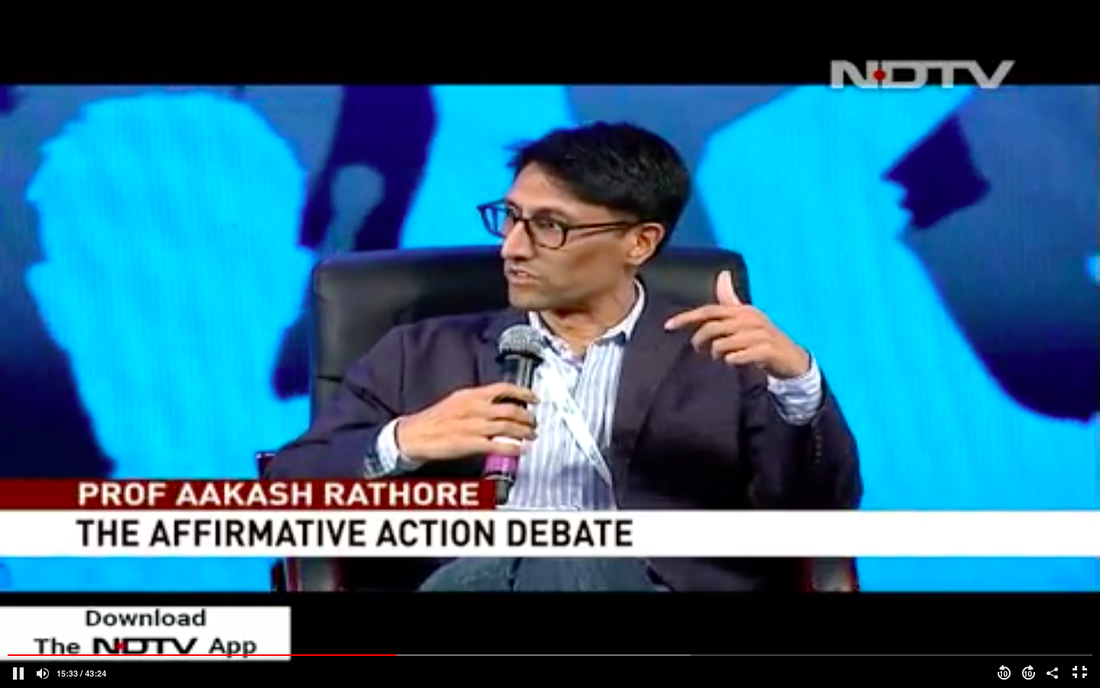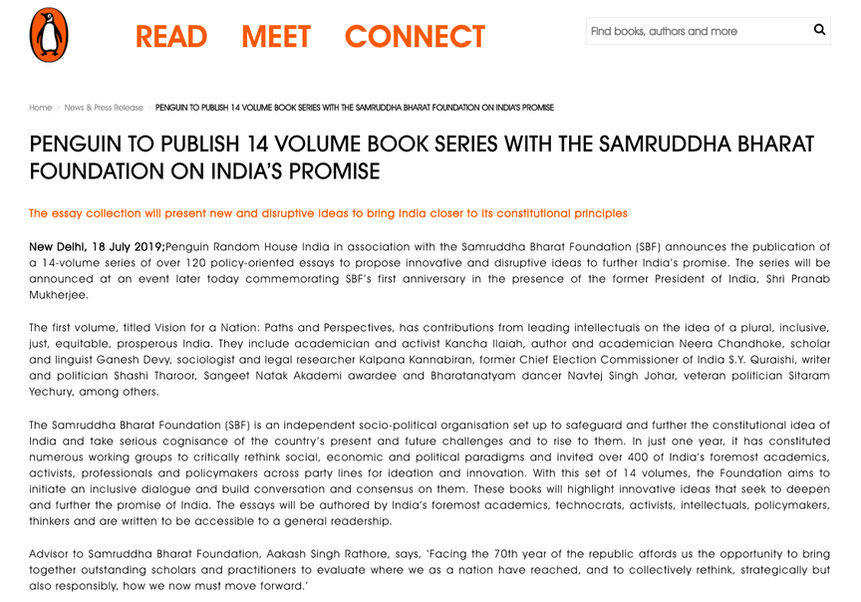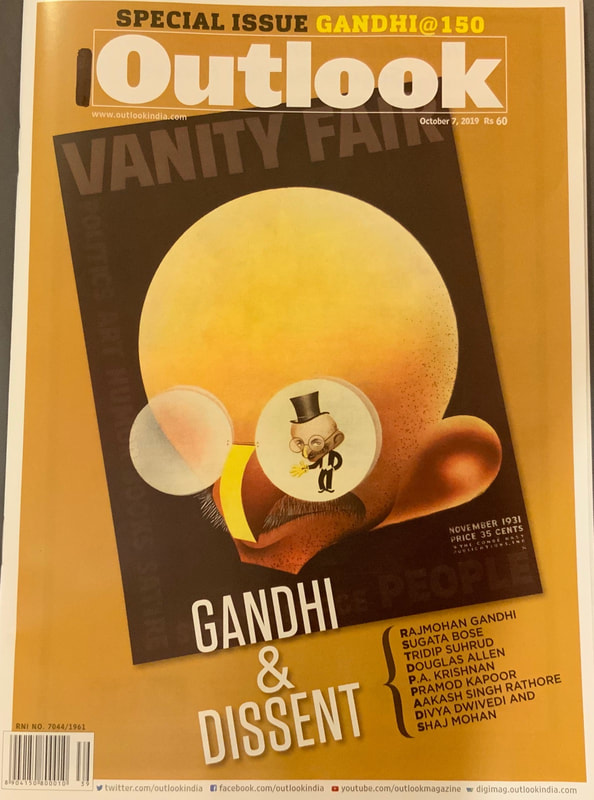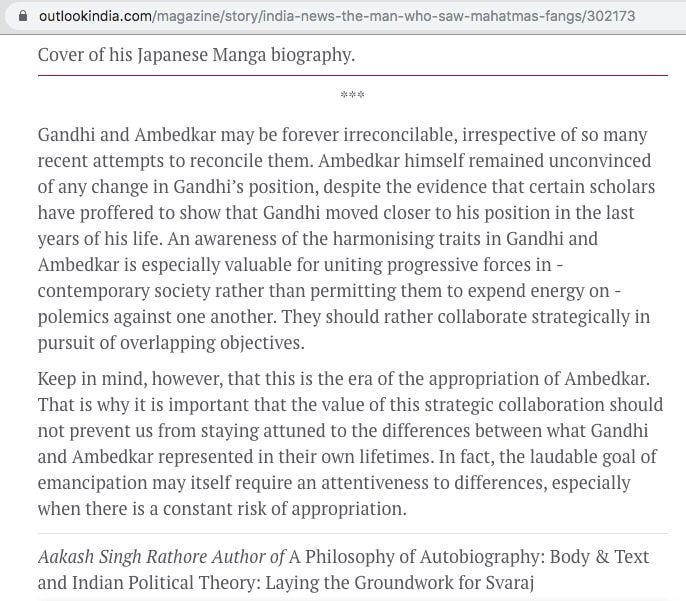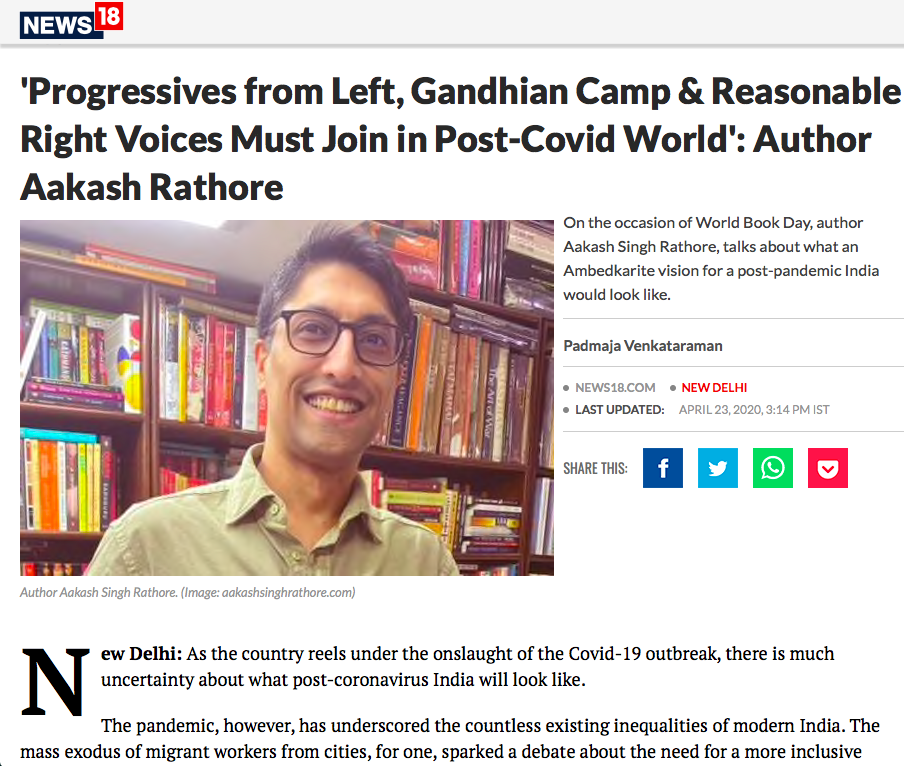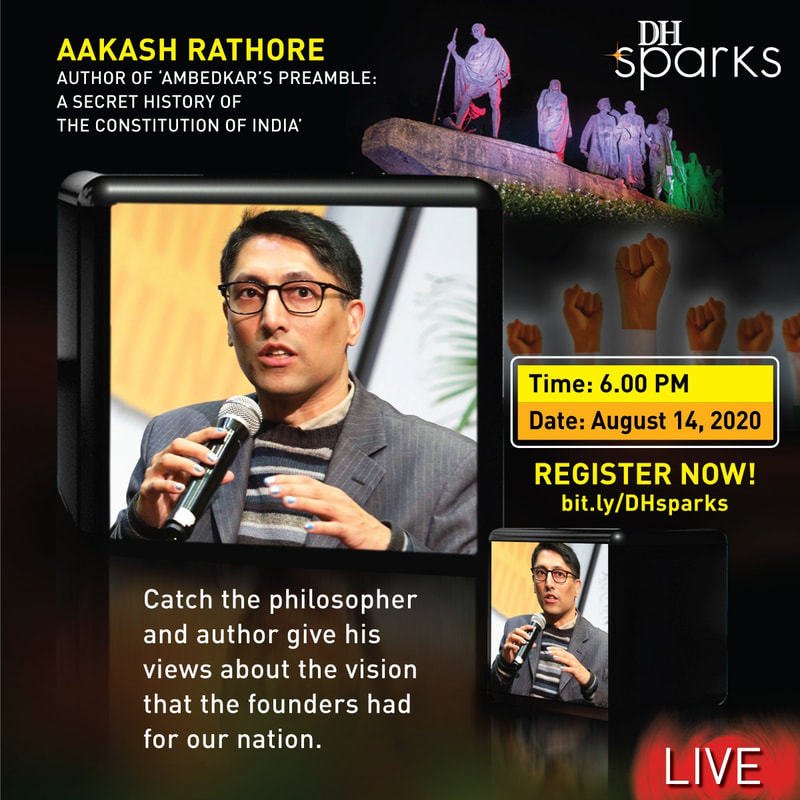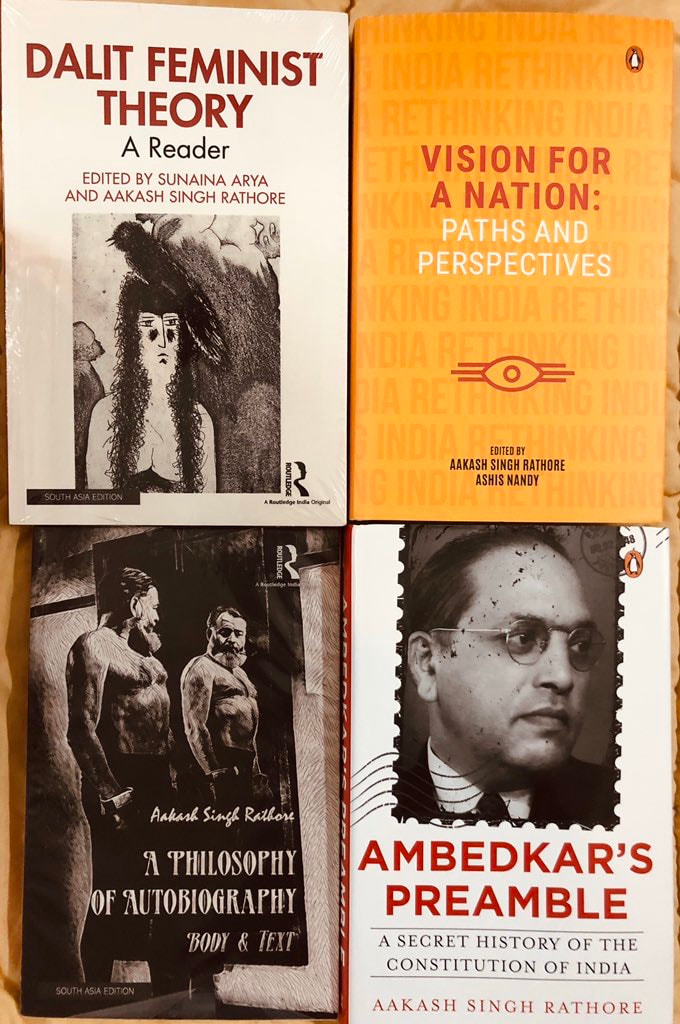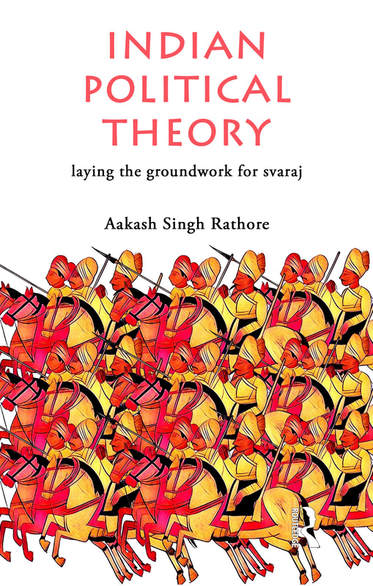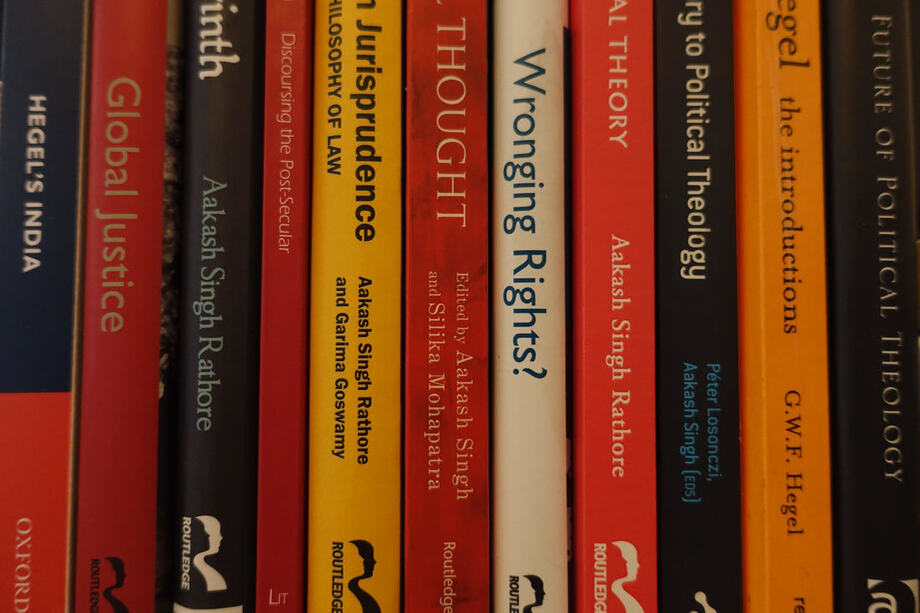- Home
-
Books
- Becoming Babasaheb
- Ambedkar’s Preamble
- Vision for a Nation
- A Philosophy of Autobiography: Body & Text
- Dalit Feminist Theory
- B.R. Ambedkar: The Quest for Justice
- Plato’s Labyrinth
- Hegel's India
- Wronging Rights?
- Hegel's India - Reviews
- Indian Political Theory
- Global Justice
- Rethinking Indian Jurisprudence
- Indian Political Thought
- Discoursing the Post-Secular
- Buddhism and the Contemporary World
- The Future of Political Theology
- From Political Theory to Political Theology
- B. R. Ambedkar: The Buddha and His Dhamma
- India Wins Freedom
- Eros Turannos
- Reading Hegel
- The Complete Indian Wine Guide
- Ironman & Martial Arts
- Media Articles & Appearances
- Publications
- Short Courses
- Talks, Lectures, Conferences, Workshops
- Book Series
- Videos & Podcasts
- Mind & Muscle - Quora Spaces
- Contact

Aakash Singh Rathore is a public intellectual of international repute, author of nine books, including the just-released Becoming Babasaheb: The Life and Times of Bhimrao Ramji Ambedkar (HarperCollins, 2023), and the bestselling Ambedkar's Preamble: A Secret History of the Constitution of India (Penguin, 2020). His forthcoming book, Will AI Murder Us All? will be published by Penguin in 2025. He has also edited over a dozen books ranging from political philosophy and law to literature and religion, including B.R. Ambedkar’s The Buddha and His Dhamma: A Critical Edition (Oxford University Press, 2011), and more recently, B.R. Ambedkar: The Quest for Justice (a box-set of 5 vols, Oxford University Press, 2021). His Hegel’s India (Oxford University Press) was shortlisted for the Non-fiction Book of the Year at the Tata Literature Live Book Awards 2017. Rathore’s books have been reviewed and featured in Scroll.in, The Wire, Outlook, The Caravan, The Quint, The Print, Livemint, The Week, EPW, The Hindu, The Indian Express, The Tribune, Deccan Herald, and many other popular print and online media outlets.
Professor Rathore has taught Politics, Philosophy, and Law at premier institutions such as Jawaharlal Nehru University and the University of Delhi, and is the only professor to hold joint appointments at both Ashoka University and Jindal Global University. He has also held many international professorships, including at UPenn and Rutgers University (in the USA), the University of Toronto (Canada), Humboldt University, Berlin (Germany), and LUISS University, Rome (Italy). He is International Fellow at ETHOS, Rome, and was previously Fellow at the Indian Institute of Advanced Study, Shimla. Rathore serves as the Series Editor of the 15-volume "Rethinking India" book series (Penguin, 2020-25), and was coeditor (with Ashis Nandy) of its first volume, Vision for a Nation. He is also Series Editor for “Religion and Democracy: Reconceptualizing Religion, Culture, and Politics in Global Context” (published by Oxford since 2015) as well as the long-running international book series, “Ethics, Human Rights and Global Political Thought” (published by Routledge since 2011).
Rathore writes the popular monthly column “Poorva Paksha” for the Deccan Herald, along with numerous bylines in The Indian Express, Outlook, The Times of India, Firstpost, Huffington Post, The Quint, The Print, Scroll.in, and other magazines and papers. Rathore is also a top-ranking triathlete, and has finished eight grueling Ironman Triathlons, known as the world’s most difficult one-day sporting event. He has featured, both as an athlete and as an author, on the Asia News Network, News18, The Caravan, Pragati podcast, The Seen and the Unseen podcast, Deccan Herald, The Sunday Times, The Hindu, The National, and NDTV. He has also spoken at the Jaipur LitFest, The Times of India Delhi LitFest, the Vidarbha LitFest, the Bangalore LitFest, and other litfests around the world. He regularly delivers talks, lectures, workshops and courses throughout India and abroad.
A social media influencer with over 140,200 Quora followers (of a blog on intersections between philosophy and physical culture: Mind & Muscle), 8,000 Instagram followers, 13,000 Twitter/X followers, and a YouTube channel with over 2,00,000 views, he engages with civil society, centres, universities, institutes at large as well as with academics, students, researchers, political workers and grassroots activists alike. He tweets at @ASR_Metta
Professor Rathore has taught Politics, Philosophy, and Law at premier institutions such as Jawaharlal Nehru University and the University of Delhi, and is the only professor to hold joint appointments at both Ashoka University and Jindal Global University. He has also held many international professorships, including at UPenn and Rutgers University (in the USA), the University of Toronto (Canada), Humboldt University, Berlin (Germany), and LUISS University, Rome (Italy). He is International Fellow at ETHOS, Rome, and was previously Fellow at the Indian Institute of Advanced Study, Shimla. Rathore serves as the Series Editor of the 15-volume "Rethinking India" book series (Penguin, 2020-25), and was coeditor (with Ashis Nandy) of its first volume, Vision for a Nation. He is also Series Editor for “Religion and Democracy: Reconceptualizing Religion, Culture, and Politics in Global Context” (published by Oxford since 2015) as well as the long-running international book series, “Ethics, Human Rights and Global Political Thought” (published by Routledge since 2011).
Rathore writes the popular monthly column “Poorva Paksha” for the Deccan Herald, along with numerous bylines in The Indian Express, Outlook, The Times of India, Firstpost, Huffington Post, The Quint, The Print, Scroll.in, and other magazines and papers. Rathore is also a top-ranking triathlete, and has finished eight grueling Ironman Triathlons, known as the world’s most difficult one-day sporting event. He has featured, both as an athlete and as an author, on the Asia News Network, News18, The Caravan, Pragati podcast, The Seen and the Unseen podcast, Deccan Herald, The Sunday Times, The Hindu, The National, and NDTV. He has also spoken at the Jaipur LitFest, The Times of India Delhi LitFest, the Vidarbha LitFest, the Bangalore LitFest, and other litfests around the world. He regularly delivers talks, lectures, workshops and courses throughout India and abroad.
A social media influencer with over 140,200 Quora followers (of a blog on intersections between philosophy and physical culture: Mind & Muscle), 8,000 Instagram followers, 13,000 Twitter/X followers, and a YouTube channel with over 2,00,000 views, he engages with civil society, centres, universities, institutes at large as well as with academics, students, researchers, political workers and grassroots activists alike. He tweets at @ASR_Metta
April 2023
Becoming Babasaheb
The Life and Times of Bhimrao Ramji Ambedkar (Volume 1)
Birth to Mahad (1891-1929)
Aakash Singh Rathore
‘Rooted in extensive archival research, Becoming Babasaheb follows Ambedkar’s personal and intellectual development on his path to becoming one of India’s greatest statesmen. In clear and wonderfully descriptive writing, Aakash Singh Rathore’s first volume brings Ambedkar—the subjugated village child, the brilliant student, the rising leader—to life.’
— Shashi Tharoor, Member of Parliament for Thiruvananthapuram (Lok Sabha) and author of Ambedkar: A Life
There are many intellectual biographies of Dr B.R. Ambedkar, but until now none has sought to reveal the personality of the man. They will tell you what he thought or what he wrote, but remain silent about who he actually was, his inner struggles, how he felt. They give information about Ambedkar, but do not talk about his interior life, his personal growth or how he came to be the man who left such an indelible mark on modern India's constitutional, political, social and religious landscapes.
The first of an ambitious two-volume biography, Becoming Babasaheb traces Ambedkar's life journey, from his birth in 1891 to the transformative Mahad Satyagraha in 1929. It takes a completely fresh look at Ambedkar's lived experiences and teases out the nature and character of the man behind the legend. It offers an extensive, personality-driven narrative covering Ambedkar's life, along with salient aspects of his contemporary legacy, unfolding as a tale of remarkable tenacity, which it chronicles in all its rich vitality.
All of Ambedkar's books and speeches are publicly available, so large volumes will forever appear interpreting his writings and presenting his ideas. Meanwhile, old myths and inaccurate 'facts' about his thought and life events, even his relationships, persist. Becoming Babasaheb has been written on the basis of entirely original archival research to set the historical record straight. A vivid portrait of the man in his times, both volumes of this biography will present readers with a new Ambedkar, the true Ambedkar.
Reviews, features and book events of Becoming Babasaheb here
— Shashi Tharoor, Member of Parliament for Thiruvananthapuram (Lok Sabha) and author of Ambedkar: A Life
There are many intellectual biographies of Dr B.R. Ambedkar, but until now none has sought to reveal the personality of the man. They will tell you what he thought or what he wrote, but remain silent about who he actually was, his inner struggles, how he felt. They give information about Ambedkar, but do not talk about his interior life, his personal growth or how he came to be the man who left such an indelible mark on modern India's constitutional, political, social and religious landscapes.
The first of an ambitious two-volume biography, Becoming Babasaheb traces Ambedkar's life journey, from his birth in 1891 to the transformative Mahad Satyagraha in 1929. It takes a completely fresh look at Ambedkar's lived experiences and teases out the nature and character of the man behind the legend. It offers an extensive, personality-driven narrative covering Ambedkar's life, along with salient aspects of his contemporary legacy, unfolding as a tale of remarkable tenacity, which it chronicles in all its rich vitality.
All of Ambedkar's books and speeches are publicly available, so large volumes will forever appear interpreting his writings and presenting his ideas. Meanwhile, old myths and inaccurate 'facts' about his thought and life events, even his relationships, persist. Becoming Babasaheb has been written on the basis of entirely original archival research to set the historical record straight. A vivid portrait of the man in his times, both volumes of this biography will present readers with a new Ambedkar, the true Ambedkar.
Reviews, features and book events of Becoming Babasaheb here
January 2020
Ambedkar’s Preamble
A Secret History of the Constitution of India
Aakash Singh Rathore
December 2019
Vision for a Nation
Paths and Perspectives
Edited by Aakash Singh Rathore and Ashis Nandy
|
A Philosophy of Autobiography Body & Text This book offers intimate readings of a diverse range of global autobiographical literature with an emphasis on the (re)presentation of the physical body. The twelve texts presented here include philosophical autobiography (Nietzsche), autobiographies of self-experimentation (Gandhi and Mishima), literary autobiography (Hemingway, Das) as well as other genres of autobiography, including the graphic novel (Spiegelman, Satrapi), as also documentations of tragedy and injustice and subsequent spiritual overcoming (Ambedkar, Pawar, Angelou, Wiesel). A Philosophy of Autobiography delves into how the authors deal with the flesh through their autobiographical writing and in what way they embody the essential relationship between flesh, spirit and word. The book analyses Ecce Homo, The Story of My Experiments with Truth, Waiting for a Visa, I Know Why the Caged Bird Sings, A Moveable Feast, Night, Baluta, My Story, Sun and Steel, The Philosophy of Andy Warhol, MAUS and Persepolis. More here |
Plato’s Labyrinth Sophistries, Lies and Conspiracies in Socratic Dialogues This original and stimulating study of Plato's Socratic dialogues rereads and reinterprets Plato's writings in terms of their dialogical or dramatic form. Taking inspiration from the techniques of Umberto Eco, Jacques Derrida, and Leo Strauss, Aakash Singh Rathore presents the Socratic dialogues as labyrinthine texts replete with sophistries and lies that mask behind them important philosophical and political conspiracies. Plato's Labyrinth argues that these conspiracies and intrigues are of manifold kinds – in some, Plato is masterminding the conspiracy; in others, Socrates, or the Sophists, are the victims of the conspiracies. With supplementary forays ('intermissions') into the world of Xenophon and the Sophists, the complex and evolving series of overlapping arguments that the book lays out unfold within an edgy and dramatic narrative. Presenting innovative readings of major texts – Plato's Parmenides, Republic, Symposium and Meno as also Homer's Odyssey – this work is an ambitious attempt to synthesize philological, political, historical and philosophical research into a classical text-centred study that is at once of urgent contemporary relevance. More here |
Hegel’s India A Reinterpretation, with Texts ‘Hegel’s India takes the challenge of a detailed reading of Hegel’s texts with a surprising result: behind Hegel’s dismissal of India, there lies not only his profound fascination with India but also an uncanny proximity between India’s ancient wisdom and Hegel’s speculative thought.’ — Slavoj Žižek International Director, the Birkbeck Institute for the Humanities, University of London, United Kingdom More here and here |
Series Editor: Rethinking India
Deccan Herald
14 August 2020
"As India gears up to celebrate 74th Independence day, in today's edition of DH Sparks, we focus on a pertinent question - 'Have we lived up to the ideals of the freedom struggle?'"
Plato's Labyrinth‘Just as some mysterious force compels the author of Plato's Labyrinth to train for triathlons in the crowded and dangerous labyrinths of New Delhi, so too does this same force compel him, as one of India’s foremost political theorists, to guide his readers through the labyrinths of Plato’s dialogues. What purpose do these two pursuits share? Aakash Singh Rathore refers to the conspiracy in universities that prevents students from understanding fully the radical and erotic nature of Platonic philosophy. This book charms his readers just as Socrates charmed many Athenians to show that philosophizing is not a useless luxury but the most profound form of liberation available to humanity.’ John von Heyking, Professor, Department of Political Science, University of Lethbridge, Canada, and author of The Form of Politics: Aristotle and Plato on Friendship. |
|
Aakash Singh Rathore speaks on
Indian Political Theory
Indian Political Theory puts forward a
workable contemporary ideal of thin svaraj, i.e., political, and
free of metaphysical commitment.
At present, a nativist turn in Indian political theory
can be observed. There is a general assumption that the
indigenous thought to which researchers are supposed to be
(re)turning may somehow be immediately visible
by ignoring the colonization of the mind and polity.
In such a conception of svaraj (which can be translated as
‘authentic autonomy’),
the tradition to be returned to would be that of the indigenous elites.
In Indian Political Theory, this concept of
svaraj is defined as a thick conception,
which links it with exclusivist notions of
spirituality, profound anti-modernity, exceptionalistic moralism,
essentialistic nationalism and purism.
However, post-independence India has borne witness to an
alternative trajectory: a thin svaraj.
The model proposed is inspired by B.R. Ambedkar's thoughts,
as opposed to the thick conception found in the works of
M.K. Gandhi, K.C. Bhattacharya and Ramachandra Gandhi.
This book argues that political theorists of Indian politics continue to work with
categories and concepts alien to the lived social and political experiences
of India's common man, or everyday people.
Consequently, it emphasises the need to
decolonize Indian political theory,
and rescue it from the grip of western theories,
and fascination with western modes of historical analysis.
The necessity to avoid both universalism and relativism
and more importantly address the political predicaments of ‘the people’ is the key objective of the book,
and a push for a reorientation of Indian political theory.
An interesting new interpretation of a contemporary ideal of svaraj,
this analysis takes into account influences from other cultures
and sources as well as eschews thick conceptions that stifle imaginations and imaginaries.
|
|
|
|
Proudly powered by Weebly

